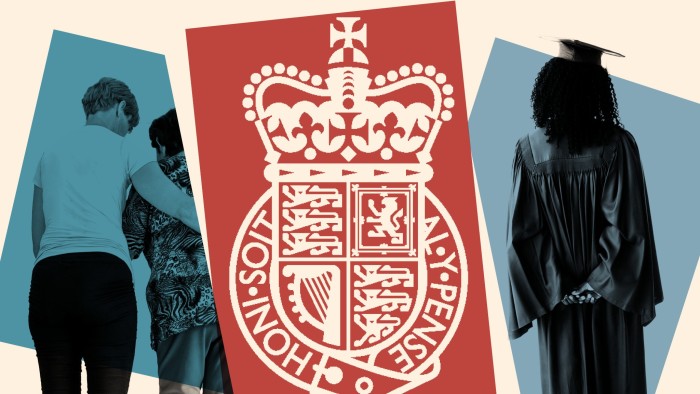The UK’s post-Brexit immigration system has been all but demolished by the sweeping reforms set out on Monday by Sir Keir Starmer’s government.
The white paper outlining the prime minister’s plans to overhaul the country’s immigration system will restrict work visas to graduate roles, with only narrow, time-limited routes for lower-skilled roles in sectors with shortages.
The UK’s path to settlement will become one of the longest in the developed world, unless migrants can prove their contribution to society. Higher fees and salary thresholds will also make the system one of the most expensive.
“These new measures, combined with the ones the previous government introduced early last year, roll back most of the liberalisations that the post-Brexit immigration policy brought in,” said Madeleine Sumption, head of Oxford university’s Migration Observatory think-tank.
Starmer has argued that a surge in net immigration seen since 2020, which peaked above 900,000 in mid-2023, did not prevent the economy from stagnating. If anything, ministers contend, the ease of overseas recruitment was damaging, giving no incentive to hire and train in the UK.
“It has left UK growth too often reliant upon short-term, immigration driven increases in the size of the labour market, rather than on sustained increases in productivity,” the white paper said.
The Home Office estimates the changes will cut the number of people arriving in the UK each year by about 100,000, although the effect on net migration is less clear, as this depends on how long people stay and whether they eventually settle.
Economists say this will make little difference either way to the outlook for per capita growth in GDP — a better measure of living standards than overall GDP growth, even though the latter is important for the Treasury’s short-term fiscal calculations.
“It’s no game-changer for the direction of GDP,” said Sumption. “What it [the longer settlement route] does do is bring in a lot more revenue for the Home Office.”
The combination of higher fees, higher salary thresholds and a potential 10-year wait for settlement could push the total cost of sponsoring a skilled worker with a partner and two children as high as £67,000, if the employer bore the full cost, according to Nick Rollason, head of immigration at the law firm Kingsley Napley.
The shift in the mix of migration towards higher-skilled graduates, who pay more tax and draw less on state support over time, could also give a small boost to the public finances, according to Brian Bell, head of the government’s Migration Advisory Committee.
Bell said it was still far from clear how the new system for visas in sectors affected by labour shortages would work, especially where there was no sectoral body to lead a workforce strategy. But he argued that employers could become more likely to “change the structure of production” and offer jobs accessible to those outside the labour market — a crucial policy aim of ministers — as they faced the phasing out of visas for lower-skilled work.
But there will be a short-term shock for the sectors that have relied most on overseas labour, in particular, for care providers who face an immediate closure of the visa route, and a three-year wait for the government to formulate policy on the sector’s long-term funding.
Applications for care visas have already fallen sharply as a result of the ban on workers bringing family to the UK, and tougher scrutiny of employers.
“It very much feels like this government is deliberately targeting the care sector to make things as hard as possible for us,” said Josh Hawker, head of operations at AbleCare Homes in Bristol, noting the changes came on top of rises in employer national insurance and the minimum wage.
“It could be a good policy to increase pay and conditions in the social care sector, but it’s hard to see how that doesn’t cost you money,” said Jonathan Portes, a professor at King’s College, London, adding: “How much is it going to cost and who’s paying? It’s either the taxpayer or people who are in care and their kids.”
For universities, the changes announced to post-study visas were less drastic than feared by the sector, as international students will still be able to work in any job for 18 months after finishing their course. But there was a sting in the tail. Universities will not only have to do more to police compliance with immigration rules, but could also face a 6 per cent levy on their fee income from international students.
“The idea of a levy on international students will be deeply controversial . . . a levy will be seen by many as a tax on a very successful UK export sector,” said Nick Hillman, director of the Higher Education Policy Institute.
Meanwhile, for political strategists and Labour MPs, the biggest concern was not around the economic impact of the changes, but the message Starmer was sending, in particular by his warning that the UK could become an “island of strangers” and to his suggestion that migration had done “incalculable damage” to the country.
Robert Ford, a professor of political science at Manchester university, said he thought Starmer’s framing was “absolutely disastrous”.
“They have opted to lead with the strongest possible ‘Nigel Farage is right, don’t vote for him’ headline,” he said, adding that Starmer could have instead opted for a softer narrative that immigration brings many gains but needs to be controlled to maximise its benefits.
“We’re potentially adding more costs to business by making it harder and more expensive to recruit. We’re also basically saying Reform UK is right,” said one Labour MP. “Being the diet version doesn’t win you votes when the full fat option is available.”




